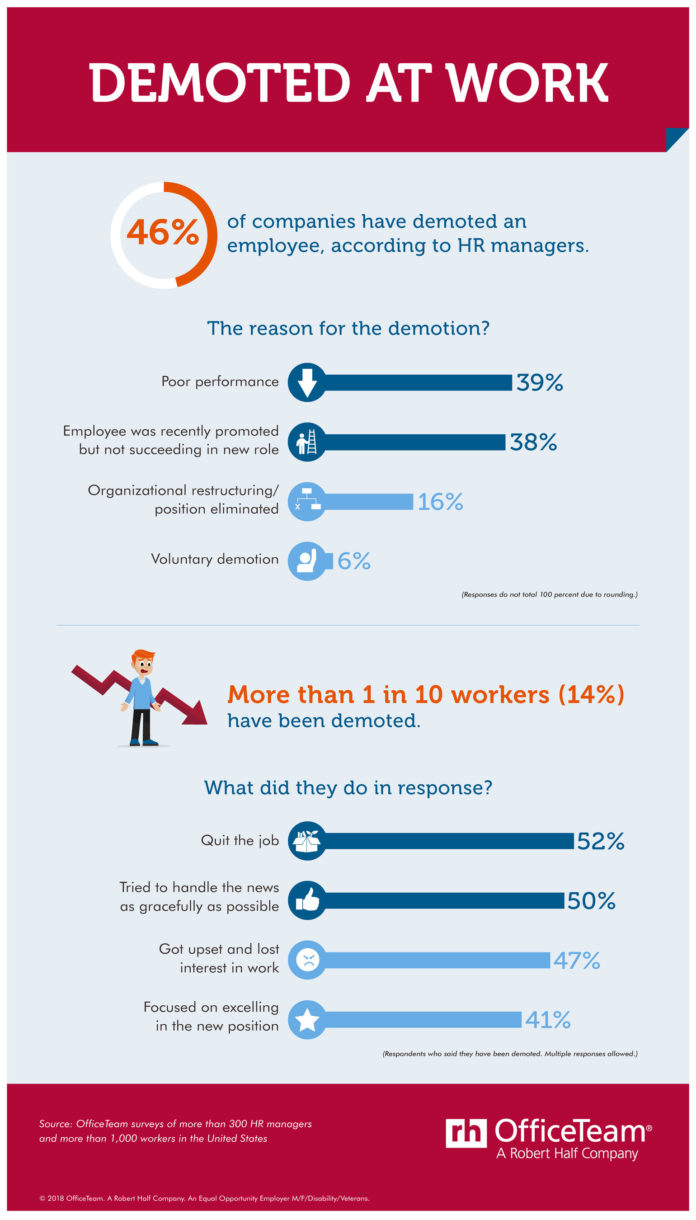
– More than one in 10 workers have been moved to a lower role at a job; it’s happened most to male professionals and those ages 18 to 34
– 52 percent of employees who were demoted quit; 47 percent became disengaged
Before you start thinking that your recent career downsize was exclusive to you – ask yourself: How common are demotions at work? According to new research from staffing firm OfficeTeam, nearly half of HR managers (46 percent) have seen someone at their company moved down a rung on the career ladder. Professionals were most commonly demoted for poor performance (39 percent) and not succeeding in a new job after being promoted (38 percent).
A separate survey found that more than one in 10 workers (14 percent) have been asked to take on a lower role. In terms of gender, 19 percent of male professionals were demoted versus 7 percent of women. Employees ages 18 to 34 (22 percent) were downgraded positions more often than those ages 35 to 54 (10 percent) and 55 or older (3 percent).
View an infographic about demotions at work. Data tables with a breakdown of the results by company size, gender and age are also available.
HR managers were asked, “Has an employee ever been demoted at your company?” Their responses:
|
Yes |
46% |
|
No |
54% |
|
100% |
HR managers who said an employee has been demoted were also asked, “What was the reason for the demotion?” Their responses:
|
Poor performance |
39% |
|
Employee was recently promoted but not succeeding in new role |
38% |
|
Organizational restructuring/position eliminated |
16% |
|
Voluntary demotion |
6% |
|
99%* |
|
*Responses do not total 100 percent due to rounding. |
Additional findings:
- HR managers at companies with 500 to 999 and 1,000 or more employees were most likely to have seen a worker demoted (77 percent and 91 percent, respectively).
- While half (50 percent) of professionals who were downgraded positions tried to handle the news as gracefully as possible, 52 percent quit, and 47 percent got upset and lost interest in their jobs.
- Male employees (55 percent) and those ages 18 to 34 (64 percent) most often resigned in response to being demoted.
“A demotion may happen for a variety of reasons, including performance issues, organizational changes, and an employee requesting fewer responsibilities due to personal or career priorities,” said Brandi Britton, a district president for OfficeTeam. “It’s never easy to accept a lower role, but workers can show their professionalism and bounce back by keeping their emotions in check, understanding the root cause and performing at a high level to position themselves for future advancement.”
OfficeTeam offers three tips for workers when dealing with an involuntary demotion:
- Remain calm. Focus on understanding why your role is being downgraded.
- Get details. Find out what’s expected in the new position and if there are steps you can take to be reinstated in your previous job. Ask your manager to identify areas for improvement and training opportunities.
- Weigh the options. Think through the changes before deciding whether you want to make the most of the role or look for a different one that better suits your long-term goals.
About the Research
The surveys were developed by OfficeTeam and conducted by independent research firms. They include responses from more than 300 HR managers at U.S. companies with 20 or more employees and more than 1,000 U.S. workers 18 years of age or older and employed in office environments.



